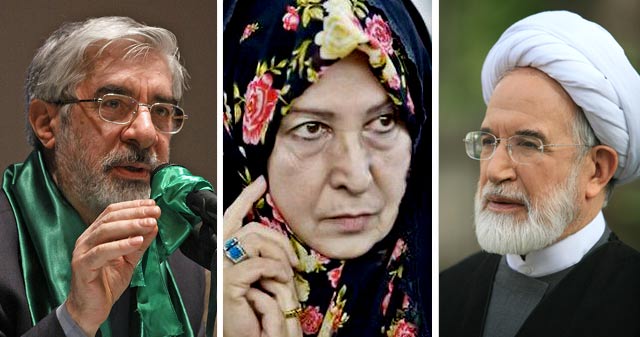UN Working Group Calls on Iran to Release the Opposition Leaders

The UN WGAD is a body of five independent experts who review cases of arbitrary detentions, issue opinions, and communicate their concerns to governments regarding alleged cases of arbitrary detention. The WGAD acts under the UN Human Rights Council, to which it submits annual reports.
(January 22, 2013) The United Nations Working Group on Arbitrary Detention (WGAD) has issued an opinion “request[ing] the Government [of Iran] to release Hossein Mossavi, Mehdi Karoubi, [and] Zahra Rahnavard,” calling their detention “arbitrary (and thus prohibited).” The WGAD also stated that the Iranian government “violated international human rights law [and] also Iranian laws” by holding the opposition leaders without charges or a trial.
The opinion came in response to a submission to the UN Working Group by the International Campaign for Human Rights in Iran detailing the circumstances of the de facto house arrests of the opposition leaders since February 2011.
Calling the arbitrary detention of Mousavi, Karroubi, and Rahnavard “a matter of grave concern,” the WGAD recommended that the Iranian government “accord [them] an enforceable right to compensation.” In addition to its determination that the detentions are arbitrary, the WGAD noted “the pattern of human rights violations documented over the years” in Iran.
The UN WGAD is a body of five independent experts who review cases of arbitrary detentions, issue opinions, and communicate their concerns to governments regarding alleged cases of arbitrary detention. The WGAD acts under the UN Human Rights Council, to which it submits annual reports.
The Campaign welcomes the opinion by the WGAD and calls on the Iranian government and particularly Supreme Leader Seyed Ali Khamenei to release Mousavi, Karroubi, and Rahnavard immediately.
“The upcoming presidential election in June in Iran can not have any semblance of legitimacy as long two candidates from the 2009 election are held under house arrest,” said Hadi Ghaemi, the Campaign’s executive director.
“There is no justification that these illegal detentions have continued for nearly two years now, without any charges to speak of, no rule of law, absolutely no judicial process. The Supreme Leader is ultimately responsible and must immediately release these opposition leaders,” Ghaemi added.
Despite sending this opinion to the Iranian government in March 2012, the WGAD noted that it has received no reply. The Campaign calls on Iranian authorities to act according to the ruling of the WGAD.
Mir Hossein Mousavi and Mehdi Karroubi, two presidential candidates in the disputed June 2009 election in Iran, along with Zahra Rahnavard, an outspoken critic of the government and Mousavi’s wife, have been under house arrest since February 14, 2011, when they called for demonstrations in support of the Arab Spring. Fatemeh Karroubi, a social activist and Karroubi’s wife, was also put under house arrest at the time but has since been released due to medical reasons.
In the two years since the detention of the opposition leaders, many activists and organizations, including the Campaign, have called on the Iranian government to end this arbitrary and illegal house arrest. The house arrest has been condemned repeatedly by the United Nations, including by the Secretary General, the Special Rapporteur on human rights in Iran, the Human Rights Council, the General Assembly, and the Working Group on Arbitrary Detention. Various Iranian officials have responded in the media with contradictory remarks about the status of the house arrest, but there has been no movement to either charge the detainees or release them.
On December 25, 2012, Police Chief Esmaeel Ahmadi Moghaddam said that the Supreme Leader had claimed responsibility for Mousavi, Karroubi, and a few others, according to Kayhan newspaper published in Tehran. “At a meeting after the Ashura Day sedition [December 16, 2010], we [the police] told him [the Supreme Leader] that a group of individuals involved in this sedition must be arrested. He said, ‘First collect the facts, then bring them to me and I will give you permission.’ After we collected the facts, we took a list of 40 individuals to him; he said ‘I will take care of these few’” and signaled a group including the opposition leaders, according to Moghaddam as quoted in the Kayhan article. In the same article, in response to a question about the lack of a trial, the police chief was quoted as saying, “Do you think for individuals who caused such a sedition and did what they did, house arrest was sufficient?!”
In November 2011 Mohammad Javad Larijani, a top Iranian official and head of the High Council for Human Rights of the Islamic Republic of Iran, responded to a question about the opposition leaders in a press conference at the United Nations, saying, “Well, nobody is in house arrest without trial and without court order. Incitement to violence is a major cause against them, and this is quite apparent for everybody.” Larijani added that the details of Mousavi’s and Karroubi’s charges would come out once court proceedings began and stated that they were also charged with other “illegal activities,” which he did not name. No such court proceedings have taken place in the 14 months since Larijani’s statement.






